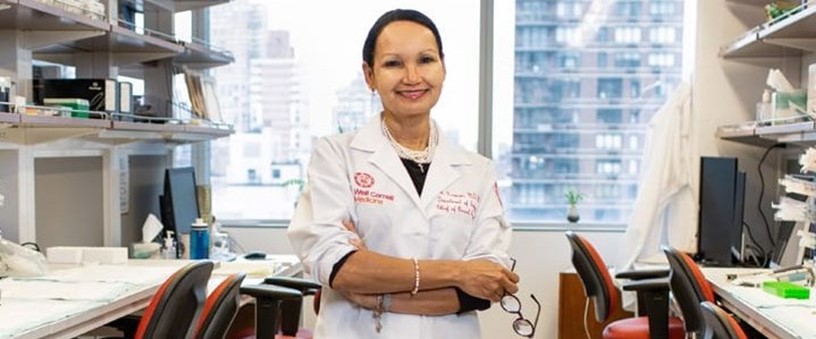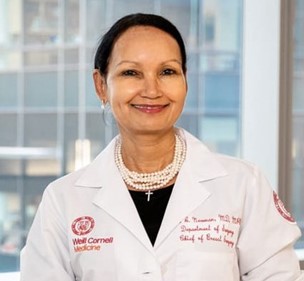Who else gets all the good feelings when you hear the theme music to your favorite childhood soap opera? In this exclusive conversation with Lisa A. Newman, MD, MPH and surgical oncologist, Chief Community Activator, Tisha Hammond, documents the story of how Dr. Newman brought General Hospital to real life and saved numerous lives along the way to racing to the cure.
A recipient of the Career Mastered Women’s History Leadership in Action Award, she leads a team of breast surgeons that uses state-of-the-art screening and imaging technologies, innovative surgical and reconstruction techniques, and radiation therapies to provide patients with comprehensive breast cancer care. .
Whether you’re in the state of mind in the fictional town of Port Charles, New York, or living alongside Dr. Newman in one of the five Boroughs of New York City, you and your breasts will want to read along. If it makes you feel really good, go ahead and load up the soundtrack to your favorite soap opera and enjoy the next several minutes with a world-renowned Health Care Hero.

Career Mastered Magazine (CMM): Dr. Lesley Webber, from the General Hospital soap opera, was your childhood role model. You’ve actually worked at Massachusetts General Hospital. Tell us about that early stage of your career
Dr. Lisa A. Newman (Dr. Newman): I have many fond memories of my experiences as a volunteer at Massachusetts General Hospital while I was a college student at Harvard. My responsibilities were of course extremely limited, usually involving escorting patients to different appointments, and transporting specimens from the clinic or emergency room to the laboratory.
I recall being in tremendous awe while I observed many brilliant physicians using their expertise to make rapid but accurate decisions regarding various patients and their acute problems, while simultaneously providing empathetic reassurance that everything possible was being done to restore health and wellness. It is a great honor for me to now serve in the ranks of the medical workforce and I am incredibly proud of this profession. My experience as a volunteer also makes me more mindful of my responsibilities to try to serve as a role model and mentor for the younger generation of physicians and scientists.
This is especially important for students and trainees from communities of color because Black/African American and Hispanic/ LatinX individuals are woefully under-represented in the healthcare workforce. This lack of diversity weakens the medical profession because it represents our failure to tap into the talent and creativity that exists in our large, robustly diverse population.
CMM: Your research has a focus on ethnicity. Tell us how COVID-19 factors into your current studies.
Dr. Newman: The COVID-19 pandemic was disproportionately devastating in communities of color because of health care access issues and also because of exposures since Black/African Americans and Hispanic/ LatinX individuals accounted for a large proportion of the essential workforce that was exempted from shelter-in[1]place mandates and that kept our communities going during the pandemic shutdown. The COVID shutdown-related economic recession was also more severe in communities of color, which has led to disproportionately higher rates of unemployment that persist in the Black/African American and Hispanic/LatinX communities. The inadequate recession recovery among communities of color means that we need to double down on outreach videopad gigapurbalingga efforts to get women in these communities appropriately screened for breast cancer. Stage distribution of breast cancer has historically been more advanced in these communities, and the COVID experience threatens to exacerbate this disparity.
CMM: Please tell the Career Mastered community three (3) insights that breast cancer advocates and caregivers need to know.
Dr. Newman:
- Breast health awareness educational activities and promotion of screening mammography are lifesaving efforts that improve early detection of breast cancer. Catching breast cancer early improves the likelihood that the cancer will be treated successfully and increases the ability to offer breast-saving surgical options. Early detection is also associated with a lower risk of needing chemotherapy.
- Mammograms are extremely valuable but they are definitely NOT perfect, and so women still need to be aware of potential breast cancer danger signs, for example, a new lump in the breast or underarm area, a bloody nipple discharge, or changes in the skin of the breast such as swelling or a rash/dermatitis appearance, especially if involving the nipple-areolar skin. Women should also understand that these symptoms can have completely benign/non-cancerous causes, and so women should not panic if they notice any of these changes, but they should seek medical attention promptly even if they had a recent mammogram.
- If you are not obtaining adequate answers from your health care office crackeado 2022 provider regarding your breast concerns, seek a second opinion.
CMM: Let’s talk about ‘prevention.’ Is there a vaccine available to reduce the risk of a breast cancer diagnosis?
Dr. Newman: We can reduce the chances of developing breast cancer office 365 serial by following a healthy lifestyle and avoiding obesity; this should include a regular exercise program and consuming a balanced diet with fresh fruits/vegetables daily and minimizing alcohol intake. For premenopausal women, nursing/ lactation after pregnancy can also lower breast cancer risk.
Some women are found to be at a definite high risk for breast cancer either because of benign biopsy results demonstrating overactive breast tissue or because of family history suggesting hereditary predisposition for breast cancer. These high-risk patients can be evaluated for special medication that can lower breast cancer risk, and they are also recommended to undergo supplemental breast cancer screening such as breast MRI and/or whole[1]breast ultrasound in addition to routine mammography.Some high-risk patients may consider prophylactic mastectomy surgery as an aggressive strategy to lower their risk of being diagnosed with breast cancer.
There is no vaccine currently available to reduce breast cancer risk.
Surgery is a standard-of-care component of treating non[1]metastatic breast cancer. Most patients that are diagnosed with breast cancer associated with definite evidence of spread to other organs such as the liver, lungs or bones will not be candidates for breast surgery and they will be referred for medical therapy with possible radiation as the primary treatment plan.
Tumors that are negative for all three biomarkers, the estrogen receptor (ER), the progesterone receptor (PR), and HER2/neu, are called Triple Negative Breast Cancer (TNBC). TNBC is twice as common in Black/African Americans compared to White women, and this pattern contributes to the higher breast cancer mortality rates that we see in Black/African American women. My research on TNBC has been honored to receive funding from Susan G. Komen Breast Cancer Foundation in our studies of TNBC risk associated with African ancestry, and this research has involved working with oncology colleagues in different regions of Africa.

CMM: Do you have a first-hand choice in determining the countries that you work in?
Dr. Newman: The initial choice for research partners in Africa was related to the identification of collaborators that had our shared goals and commitment. When our partnerships began (approximately 16 years ago) I was fortunate to connect with brilliant oncologists at the Komfo Anoyke Teaching Hospital in Kumasi, Ghana. Since that time, we have expanded to involve research partners in Ethiopia, Nigeria, and Uganda. We are also developing partnerships in Antigua and Mexico. I have been blessed to have had the honor of working with so many talented, brilliant physicians and researchers in various countries.
CMM: Are there different warning signs of breast cancer depending on gender? Dr. Newman: Male breast cancer is a red flag regarding possible hereditary susceptibility for breast cancer, and so we automatically recommend genetic testing in men diagnosed with breast cancer, as well as their relatives.
CMM: Who have your mentors/ advocates been?
Dr. Newman: They include renowned surgeons such as Dr. L.D. Britt, the late Dr. Eva Singletary, and the late Dr. LeSalle D. Lefall Jr. My current Department of Surgery Chairman, Dr. Fabrizio Michelassi has also been an amazing source of support and guidance. I can personally attest to the value of having mentors that reflect both genders as well as diverse backgrounds.
CMM: Your stress outlet is spending time with family. Does your immediate family call you ‘Doctor?’
Dr. Newman: My absolute favorite title in the universe is “Mom” and I look forward to the day when I can be called “Grandma,” as well!
CMM: Please leave us with your favorite quote and favorite piece of advice given or received.
Dr. Newman: This is a unique and powerful moment in time where the COVID-19 pandemic disparities occurring concomitantly with the widespread coverage of the brutal George Floyd and Breonna Taylor murders at the hands of law enforcement have forced our country to confront the impact of systemic racism on public health. My other favorite quote is also an important piece of advice to the entire nation and comes from Angela Davis: “In a racist society it is not enough to be non-racist, we must be anti-racist. And in the words of Dr. Martin Luther King, Jr., underscoring the importance of achieving equity in access to, and delivery of healthcare: “Of all the forms of injustice, inequality in health care is the most shocking and inhumane.”
Lisa Newman, M.D., MPH, is an internationally renowned breast surgeon and researcher. She was appointed chief of the Section of Breast Surgery at NewYork[1]Presbyterian/Weill Cornell Medical Center and Weill Cornell Medicine — where she was recruited as a professor of surgery andleads a multidisciplinary breast oncology program, dedicated to providing individualized, cutting-edge care. Dr. Newman has been an expert advisor to various associations, and is currently an advisory board member for the Susan G. Komen Breast Cancer Foundation.Read more about the experiences, life, and times of Dr. Lisa A Newman at https://surgery.weill.cornell.edu/ road-breast-health-equity-era[1]covid-19/bhe2021-virtual-event[1]presenters/lisa-newman-md[1]mph-facs
A global Pep Squad calls Tisha Hammond, The Small Business CheerleaderTM. She is the author of ‘Daily Devotional for Entrepreneurs: Your Season to Grow,’ host of ‘Pep Talk LIVE,’ and a Storytelling Coach. Entrepreneurs who want to attract millionaire-status media respect, attend her ‘Lights, Camera, Action’ events.



